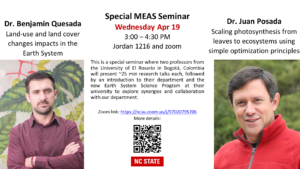
- This event has passed.
Special Seminar
April 19, 2023 | 3:00 pm - 4:30 pm
Dr Benjamin Quesada, and Dr Juan Posada, two colleagues from Colombia will be here to visit us at MEAS to give research seminars and to explore opportunities for international collaboration with our department (hosted by Camilo Rey-Sanchez). They will present ~25 min research talks each, followed by an introduction to their department and the new Earth System Science Program at their university to explore synergies and collaboration with our department. The seminar will be in 1216 Jordan Addition at 3pm and via Zoom.

Abstract – Quesada
Land-use and land cover changes impacts in the Earth System
Between 30 and 50% of the land surface today has been transformed as a result of human activities. Conversion of natural ecosystems into cropland and pastures, mostly through deforestation, has contributed to about one third of the approximate total anthropogenic carbon emissions since 1850. However, anthropogenic land cover changes do not only change atmospheric carbon balances but modify momentum, climate, carbon and water cycles. However, most recent international scientific syntheses hitherto (e.g. IPCC AR6, IPCC SRCCL) report poor agreement and little evidence across studies that have quantified the net sensitivity of climate, hydrology and carbon to realistic vegetation cover changes. Currently, Earth System Models (ESM) simulations are the most advanced tools to project those impacts. I will show here that ESM are able to simulate coherent and robust sensitivities of climate and environment to vegetation changes. Although international policy negotiations take into account only biogeochemical effects of anthropogenic vegetation cover changes, biophysical effects are essential to accurately assess land-based mitigation potential.
Abstract – Posada
Scaling photosynthesis from leaves to ecosystems using simple optimization principles
Leaves have the remarkable ability to acclimate their form and function in response to variations in light intensity (measured as photosynthetic photon flux density, PPFD). However, the underlying principle that governs this response is not fully understood, which hinders our ability to scale photosynthesis to higher levels of organization, such as the canopy. In this talk, I present evidence that leaf acclimation to PPFD is driven by the goal of maximizing photosynthetic light use efficiency (εL), which is the ratio between instantaneous leaf net assimilation and instantaneous PPFD. First, I show that 3D simulations of trees reveal that optimizing individual leaves’ εL maximizes whole-plant photosynthesis. Second, I present experimental evidence demonstrating that low εL significantly reduces plant growth. Lastly, I summarize a study of adult canopy trees in a lowland tropical forest, which shows that individual leaves do maximize εL. Since all leaves in the canopy have similar εL, ecosystem carbon gain can be estimated simply by multiplying the average εL by the absorbed PPFD, without considering the specific leaf traits and their response to PPFD gradients.